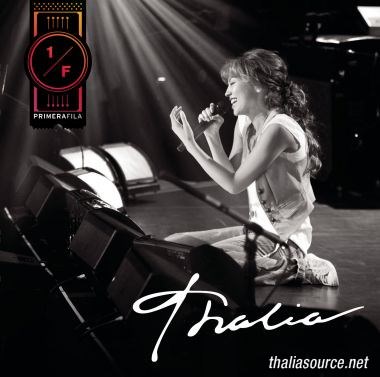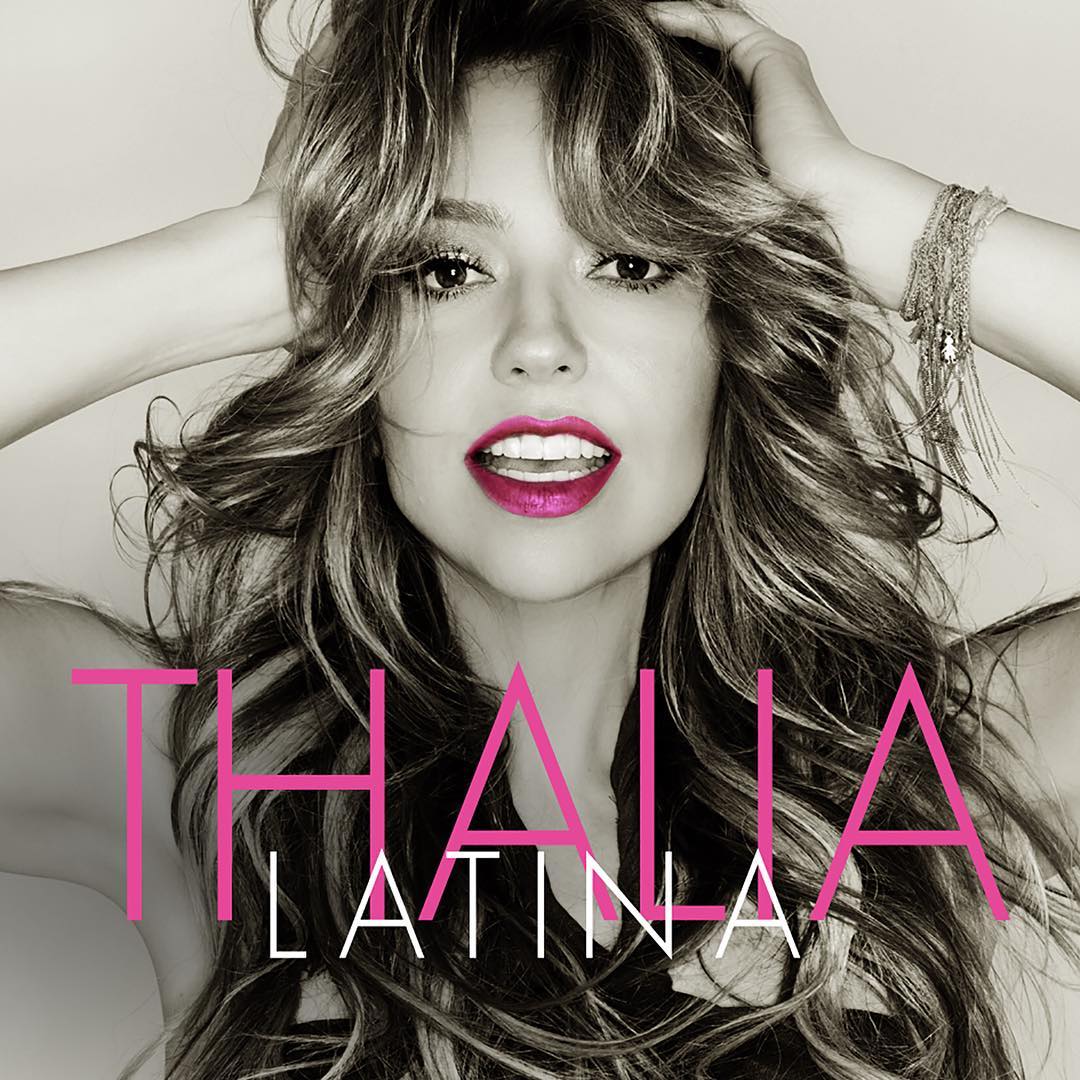In this exclusive interview, the Mexican artist and entrepreneur talks about her new single Ojitos Mexicanos, her upcoming projects, and the celebration of her decades-long career.
Thalía is one of those artists who, directly or indirectly, has been present on the soundtrack of many people's lives in Latin America. Her hits like Piel Morena, Arrasando, Equivocada, María la del Barrio, and many more have resonated in the sound systems of countries that aren't even Spanish-speaking but still understand the language of music.
At the same time, she's also one of those performers with an inexhaustible source of ideas and a desire to continue creating. Although this year she had participated as a guest on projects with other colleagues such as Los Ángeles Azules (Yo Me Lo Busqué), Ha*Ash (Amiga Date Cuenta), and Rave Jesus (Tu Amor), today she shares her first solo song of 2025, Ojitos Mexicanos. It's a cumbia of the kind she knows how to do very well and that harks back to other hits like Amor a la Mexicana, but gives it a synthesizer twist that makes it feel current. This collision of two worlds — the past and the modern — is visually present in the accompanying music video, as the beginning alone is a nod to her character in the telenovela Marimar. This new single acts as a teaser for a 2026 where she will present a "super special project" that has kept her in the studio. "I think it's a unique, magical, new stage. It's like a reset for me," she says. "I'm very happy because it excites me, it gives me electricity."
In addition to the release, this year also marks not just one, but three important anniversaries: Tu Amor, today she shares her first solo song of 2025, En Éxtasis turns 30 since its release, Arrasando turns 25, and El Sexto Sentido turns 20. The celebration included the remastering of all three albums, each of which was a milestone in her career.
In this exclusive conversation with ROLLING STONE en Español, Thalía talks about Ojitos Mexicanos and her pride in being Mexican, about having been one of the pioneers of women's liberation in the Latin music industry, and about what the end of the year will bring for her career.
What led you to work on Ojitos Mexicanos? It's a cumbia of your specialty, but it still feels modern.
I love that you say that, that it's my specialty, because I can tell you that cumbia, or this sound in particular, has been present throughout my entire discography. For three decades now, I've been singing as a solo artist, and there's always been this kind of cumbia-like, delicious sound. The accordion, the sound of the wind instruments, the cadence, the rhythm. It's part of the DNA of my music, of my legacy, of this discography, of what we've built. Now, the "thalifamilia," those who like my music and my projects, we've built it together. I've realized that even though I always explore different musical genres, whenever I go back and play a cumbia, they get excited, share happy stories, they love it, and they send me DMs. They're excited every time I bring out something that takes them back to that Thalía from Piel Morena or Amor a la Mexicana.
Yes! I don't know if it's because of the rhythm or because it's called Ojitos Mexicanos, but I related it to Amor a la Mexicana.
You're not wrong. You hit the nail on the head. When I heard it, it took me back to that. It's like the first time I heard Amor a la Mexicana and felt that electricity, that rush, that magic. And obviously, being Mexican, it feels even more so, but it did have that correlation with Amor a la Mexicana. It felt super organic to me. It fits perfectly with my story. And I continue to weave my story through my discography.
I also noticed that the song comes out right around Hispanic Heritage Month in the U.S. Did you plan for it to happen that way, or is it a coincidence?
You see, it was a wonderful coincidence. I don't believe they're coincidences. I feel like everything is a coincidence, because God has everything planned for the exact moment. I feel like I've been working on this song and the video for months, and for one reason or another, the calendar decided it would be this month. The preparation, the release time, the coordination with the teams — digital press, the company, and everything — all fell into place so that it ended up being this month.
And I say, what better month than this to release a song called Ojitos Mexicanos! Where we're all celebrating precisely that, our heritage, the wonderful heritage we carry in our blood, Latin pride, the love for our Mexico. It was a perfect fit.
Since we're talking about this Latinx pride, as a Mexican who has been living in the United States for several years, why do you think it's so important, especially now, to keep this pride — in your case, Mexican — alive?
You know, in my case, it's been something innate from the beginning. And especially when I started this solo career, my international acting career also began at the same time. So, thanks to these soap operas and these songs from the beginning of my discography, like Piel Morena, María, la del Barrio and all these iconic songs produced by Emilio Estefan, they also opened up this world for me, allowing me to travel to all countries and internationalize myself early in my career, but wherever I went, I planted the Mexican flag from the very beginning.
Wherever I went, I had this feeling: "I'm Mexican, and this is what we do in Mexico," "My country is beautiful, and my people are wonderful." So, people were already associating me and my music with my homeland, and it was very beautiful because sometimes, when I arrived in different countries, on a second, third, or fourth visit, they would say: "The Mexican Hurricane, Thalía," or "The Aztec Queen is coming." It was already known that Mexico was reaching their country through what I brought: music, acting, etc.
This year you're celebrating three very important anniversaries. Now that their remasters have been released, how significant were these three specific works for your career, and what's it like to celebrate them in 2025?
What a fantastic opportunity and gift life has given me with these albums, celebrating them this year! It was a surprise for us to say, "Hey, this year really marks 30 years of En Éxtasis. I can't believe it. En Éxtasis was the album where we discovered Piel Morena, where we discovered songs like Gracias a Dios, which was a huge hit in South America. Where we reached countries I never would have imagined with María, la del Barrio, like Indonesia, the Philippines, Greece, places like that.
Arrasando... 25 years ago, I can't believe Entre El Mar y Una Estrella came out, which would give me that number one spot on the Billboard charts. Or that right there came out, for example, Menta y Canela, which is a mambo with a [Dámaso] Pérez Prado sample. Or all these iconic songs like Arrasando itself, which is still trending on social media and suddenly even printed on t-shirts that say, "Thalía, te fallé, no estoy arrasando con la vida (Thalía, I failed you, I'm not conquering life)." These are things that make you say, "It's already crossed over into popular culture," and it's fascinating for me to celebrate these albums in this new, remastered stage for the generation that saw them born and the new generation that's rediscovering them.
It's like, "Wow, have I really done so much? Have people really liked it? And am I really still here?" It's like pinching myself all the time and saying, "I'm still here, I'm still doing something I love, and people are still with me." It's a story I didn't build alone, we built it together, and that energizes me for everything to come.
You always talk a lot about teamwork. That's been one of the pillars of your career.
Definitely. You have the ideas, you have that vision of how you want to tell the story, how you want the video to look, how you want each track to sound, how you want the mastering of each song to not change the essence discovered in that first demo. You go through that entire process walking with a huge group of people. It's not just your vision and what you want to do, share, write, or produce, but you also have an entire group that looks out for you and for you, that helps you put each step on this ladder. So, I do believe it's worth being grateful for that group work where we're all little ants walking, carrying their leaves toward a goal. And the goal is that, to create music that resonates with someone and stays in their heart.
In your early days, you were criticized and even censored for addressing sexual themes in your music, which is now quite normal. Do you think that, despite all this criticism, you helped pave the way for any female artist to feel free to sing about their desires?
I think I've been one of those who have braved the path. Yes, I think I've been part of that path that has been forged in the Spanish-language music industry, and especially for women, for the moment where all my colleagues in the music industry find themselves today. I think there were quite a few of us, and in my case, I'm absolutely certain that I was one of those sacrificed by certain situations, certain musical styles, proposals, lyrics, wardrobes, ideas, or ways of speaking and expressing myself that broke my tenacity and my desire to keep going, not give in, and be intense and indomitable. Even though I would get a little depressed because I didn't understand why they did that, I would get up and get up stronger. So I think yes, that has supported many other singers and songwriters who are currently in the industry, enjoying their way of expressing themselves, their sexuality, in a more free way.
Despite all these difficulties, you eventually began to be called the "Queen of Latin Pop" because you were precisely one of the artists who promoted the pop music produced in our countries to other countries where Spanish is not spoken. Why do you think Latin pop from the 90s and 2000s was so enchanting?
The truth is that it's a unique era, like every era. For example, the '80s were an amazing time. I think it's my favorite era in music because it was the moment when band music began to fuse with keyboards and programmed sounds. It was an impressive evolution of sounds. And then we suddenly moved into the '90s and the '00s, and everything started to move differently. So, I think every era has a special magic and a powerful learning curve.
I'll always be a woman, an artist, a singer, completely grateful that my audience considers me with these labels like the one you just mentioned, but I also like to break labels and break away from categories. I like to simply be myself, express myself, and be a woman singing. To be an artist who suddenly wants to do something totally different, new, fresh, completely alien to her, and to know that anything goes, that these days all musical fusions are valid.
Yes, throughout your discography you can find cumbias, corridos, pop, R&B, rock, salsa, bachata, a whole host of genres. What do you consider to have been your successes and failures in this exploration of your art?
The scale always tips higher one day and lower the next, and that's how it goes. I think there are projects where intuition is incredibly powerful and connects with the immediate community at that moment. It's something you might not have expected, but it resonated at that moment. Or suddenly there's something that you say, "Wow! This is a piece of cake and it's going to be incredible," and you say, "Wow! I didn't imagine it would work this way with people. It wasn't what I expected."
I think there have been many successes, honestly. And the ones where the arrow didn't really hit the mark have been tremendous successes for me because it's been a learning experience and a growth experience. It's been about trying to improve myself, to refine myself, and to understand why that happened. And to study it, to study myself, and to recalculate and recalibrate. The truth is, you learn, and it leaves you with much more than just a success.
Are you still afraid of making mistakes?
No, not about making mistakes, honestly. And being afraid? I'm not afraid. I like to break out of my own comfort zones. For example, when I completely broke out was when I made my album Primera Fila. That album was me daring for the first time to go out in a T-shirt, jeans, a little mascara, hair pulled back, and focusing on singing in front of a very limited audience with a band of super-pro musicians, and there was no one else performing but me. That broke the structure of: "Oh, you need to have a mega wardrobe, a big production..." It broke that, "Okay, let's try something minimalist and focused on what it is." And that opened up another perspective for me, it opened up another world for me.
I think it's important to allow yourself that, to allow yourself to play and dare. For example, when I started to dare with reggaeton, at that time they didn't dare to cross lines. Reggaeton artists were reggaeton artists, pop artists were pop artists, rockers were rockers. I remember that first song with Maluma, Desde Esa Noche and I said to him: "Let's see, let's do this one, dude," and he went for it. Then I followed up with No Me Acuerdo with Natti [Natasha]. That for me was also breaking another world, another barrier I hadn't thought about: "Okay, yes, you can collaborate with other musical groups and it can be super explosive."
How do you manage to keep your creativity and desire to work on different projects alive?
As long as there's life, there's creativity. As long as there's creativity, there's magic, and there are ways in which you can allow yourself to grow and change, and that's the most wonderful thing. That when you're alive and creative, you can keep shedding your skin and changing your stories. That's incredible. Every chapter of your creativity is part of an encyclopedia that shapes your life. It's wonderful.
As long as one is alive, one can find creativity in the rain. How can it be that in a sky where a storm is falling on one side, a rainbow has formed on the other? That's where creativity is born. Or, I don't know, walking and finding a butterfly: how can it be that in the middle of the city I found a butterfly? That's where creativity comes in. Or you're walking along the pavement and out of nowhere there's a little flower: how did a little flower appear in the middle of the street? People passing by, stepping on it, and it's still standing. That's where creativity lies.
What do you appreciate and are most grateful for about being able to dedicate yourself to this?
I appreciate that each project is a healing and a liberation for me as a singer, performer, and producer. I feel like I'm freeing myself, letting go, or realizing [things]: Why are you stuck here? Why won't you let go of the song? You've already mixed it, mastered it, remixed it because you didn't like it, why won't you let it go? What's happening inside you? And then it makes you see within yourself that maybe you're repeating a pattern that you didn't resolve in the past. That's what I love, that through my music I can continue healing and I can continue rediscovering things that I thought I'd let go of and I realize, "Oops! I didn't let go," and you have to close the circle.
Before we say goodbye, Ojitos Mexicanos is the starting point for what's to come in your career and, considering that desAMORfosis was your last full-length work, does this single herald a new LP?
That's such an exciting question! I'm working on a lot of projects, and especially on this super-special project, I'm super-focused on the studio. I'm spending hours and hours developing sounds, and Ojitos Mexicanos is that appetizer, that taste of what's to come. I'm especially excited about continuing to surprise people and surprising myself, because if you're not surprised, you're not contagious, you're not exciting. So, yes, I'm in the studio finishing things up, putting the last few things together.
Is there going to be a follow-up to Navidad Melancólica? What do you have coming up in December?
There are little surprises coming up this Christmas. I also really like surprising all my people who like to celebrate a more Latin Christmas, a more our own. My last album had cumbias, also pop songs. In that case, there was a beautiful one with Marcos Witt (Nació La Luz), which was a more Christian song, beautiful. So, yes, there are surprises for Christmas, there are surprises for music soon, and there are many things in the works.
Interview by Melisa Parada Borda
Photos by Alejandro Gino











